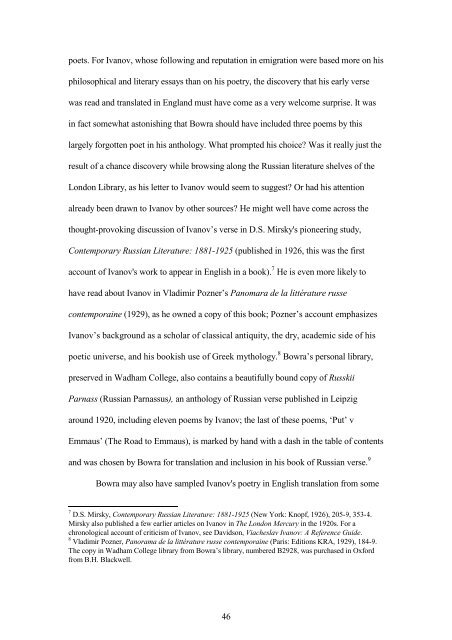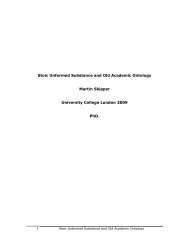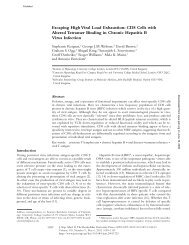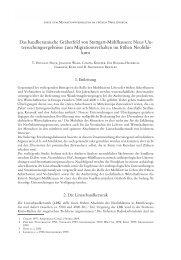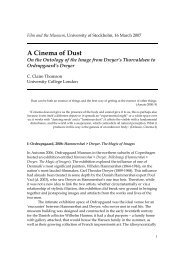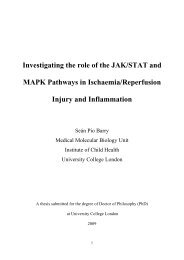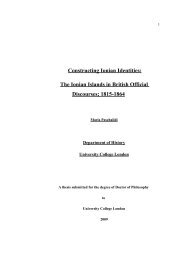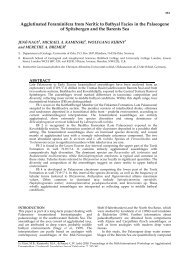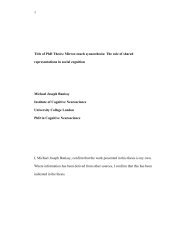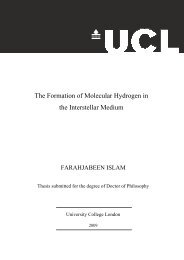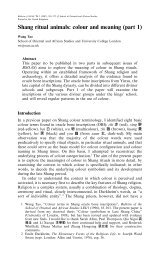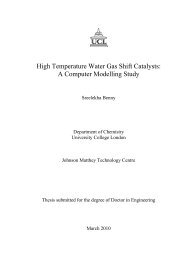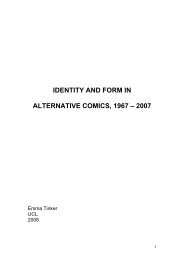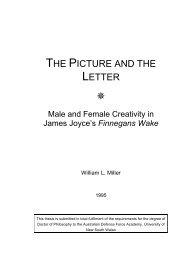Vyacheslav Ivanov and C.M. Bowra: a ... - UCL Discovery
Vyacheslav Ivanov and C.M. Bowra: a ... - UCL Discovery
Vyacheslav Ivanov and C.M. Bowra: a ... - UCL Discovery
Create successful ePaper yourself
Turn your PDF publications into a flip-book with our unique Google optimized e-Paper software.
poets. For <strong>Ivanov</strong>, whose following <strong>and</strong> reputation in emigration were based more on his<br />
philosophical <strong>and</strong> literary essays than on his poetry, the discovery that his early verse<br />
was read <strong>and</strong> translated in Engl<strong>and</strong> must have come as a very welcome surprise. It was<br />
in fact somewhat astonishing that <strong>Bowra</strong> should have included three poems by this<br />
largely forgotten poet in his anthology. What prompted his choice? Was it really just the<br />
result of a chance discovery while browsing along the Russian literature shelves of the<br />
London Library, as his letter to <strong>Ivanov</strong> would seem to suggest? Or had his attention<br />
already been drawn to <strong>Ivanov</strong> by other sources? He might well have come across the<br />
thought-provoking discussion of <strong>Ivanov</strong>’s verse in D.S. Mirsky's pioneering study,<br />
Contemporary Russian Literature: 1881-1925 (published in 1926, this was the first<br />
account of <strong>Ivanov</strong>'s work to appear in English in a book). 7 He is even more likely to<br />
have read about <strong>Ivanov</strong> in Vladimir Pozner’s Panomara de la littérature russe<br />
contemporaine (1929), as he owned a copy of this book; Pozner’s account emphasizes<br />
<strong>Ivanov</strong>’s background as a scholar of classical antiquity, the dry, academic side of his<br />
poetic universe, <strong>and</strong> his bookish use of Greek mythology. 8 <strong>Bowra</strong>’s personal library,<br />
preserved in Wadham College, also contains a beautifully bound copy of Russkii<br />
Parnass (Russian Parnassus), an anthology of Russian verse published in Leipzig<br />
around 1920, including eleven poems by <strong>Ivanov</strong>; the last of these poems, ‘Put’ v<br />
Emmaus’ (The Road to Emmaus), is marked by h<strong>and</strong> with a dash in the table of contents<br />
<strong>and</strong> was chosen by <strong>Bowra</strong> for translation <strong>and</strong> inclusion in his book of Russian verse. 9<br />
<strong>Bowra</strong> may also have sampled <strong>Ivanov</strong>'s poetry in English translation from some<br />
7 D.S. Mirsky, Contemporary Russian Literature: 1881-1925 (New York: Knopf, 1926), 205-9, 353-4.<br />
Mirsky also published a few earlier articles on <strong>Ivanov</strong> in The London Mercury in the 1920s. For a<br />
chronological account of criticism of <strong>Ivanov</strong>, see Davidson, Viacheslav <strong>Ivanov</strong>: A Reference Guide.<br />
8 Vladimir Pozner, Panorama de la littérature russe contemporaine (Paris: Editions KRA, 1929), 184-9.<br />
The copy in Wadham College library from <strong>Bowra</strong>’s library, numbered B2928, was purchased in Oxford<br />
from B.H. Blackwell.<br />
46


